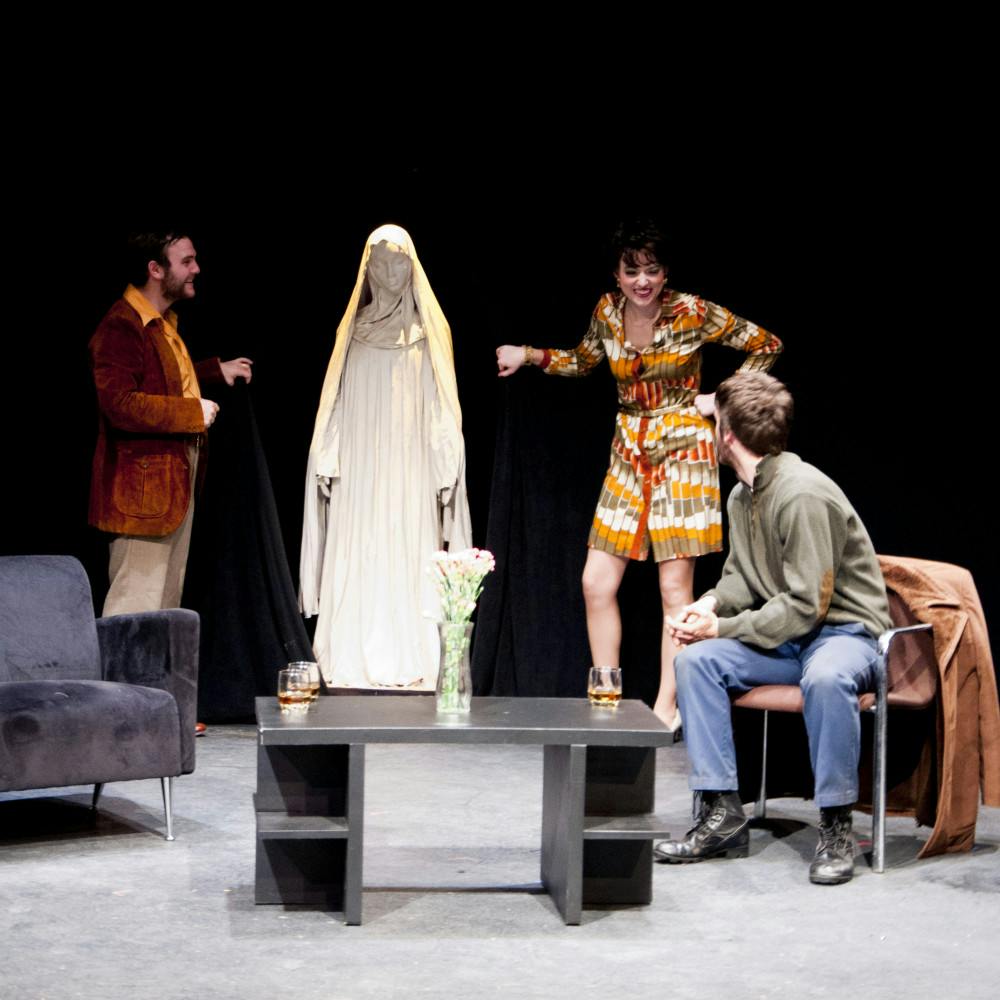From Nov. 29 through Dec. 1, The Vanek Trilogy, a collection of three, interconnected one-act plays, ran in the Hepburn Zoo. The performance was directed by Paula Bogutyn ’13.5, whose direction counted towards 700-level senior work.
The play was written by Vaclav Havel, an influential playwright during the time of the Soviet regime and the first president of the Czech Republic. The three one-acts each have the strength and depth to stand alone as separate pieces but are best enjoyed in the manner put on by Middlebury College’s theatre department this past weekend; consecutively, as a single, three-scene piece. One character Vanek, the play’s namesake and a playwright recently hired at a brewery (played by Adam Milano ’15) is featured in all three scenes. Noah Berman ’13 and Isabel Shill ’12.5, who both received 500-level junior work credit for the production, played the other characters in the piece, changing between scene.
Milano’s performance proved his strength as a rising actor within the College’s theatre department. While the other characters throughout the piece seemed to dance chaotically about, anxious to earn Vanek’s approval — or lure him into something sinister — Vanek remained largely silent, offering short words and strong insight. Milano did a beautiful job of highlighting his character’s paradoxical passive activism. In the final scene, as the audience put together the final pieces of the play’s backstory and after two scenes of Vanek’s apparent inactivity, he presents an already-written protest just as quickly as fellow-writer Stankova suggests it.
In all regards, the acting on stage was incredibly strong. While the second scene did, at times, feel a bit over-acted (and in a lot of ways, that may have been the point), I was impressed with both Berman and Shill’s ability to switch between such drastically different characters. In the first scene, Berman portrayed the drunken foreman of the brewery, practically begging Vanek for his approval. The audience could pity his character as well as criticize his attentions, ever attentive of his oft-repeated phrase, “Vanek, don’t be depressed.” And in the second scene, while the attempt to project his own insecurities onto Vanek remained the same, the overall demeanor of Berman’s character shifted drastically, running about the stage frantically, from couch to fireplace back to couch over to Vanek back to the fireplace.
The play’s slow process of revealing the backstories of the characters at first was a bit off-putting. In the first scene, we see Vanek speaking with the foreman of the brewery where he has been recently hired. The audience is thrown into the middle of this conversation, with references to the goings-on of the world without any real explanation. I struggled as I watched, trying to put together Vanek’s story while still paying attention to what was happeneng on stage. However, as the production continued more and more was revealed, both explicitly and implicitly.
This slow reveal of the backstory was the highlight of the play’s directing. Not only did the dialogue of the characters hint at Vanek’s story, but it also highlighted what was happening in the world and how he fit into it all. Bogutyn did a fantastic job at using subtle hints in the characters’ actions that showed us so much more of the world. As the stage-hands changed the props on stage between scenes, brief actions on the part of characters revealed more about the characters. Between the first and second scene, Shill’s character followed the stage-hands frantically, making sure everything was pristine and in the right place, a strong hint at the hectic caricature to come.
And before the third scene, anonymous men in suits placed bugs throughout the room, the first explicit hint at the tyrannical regime against which Vanek and his contemporaries were quietly fighting.
Another unique feature of the production with which I struggled was the use of repetition, especially in the first two scenes. At times, the repetition was an incredibly strong enhancement to the piece, emphasizing points and offering a common thread that ran between the first two scenes which otherwise, seemed a bit disjointed until it was all brought together in the third scene.
However, by the end of each scene, especially the second, the repetition moved from a matter of artistic design to feeling like the actors and author were simply trying to sledgehammer the message into the minds of the audience. Sometimes subtlety can be a play’s best friend.
With a minimally designed set that hinted at Vanek’s secrets while leaving a lot to the imagination, artful acting on part of the whole cast and some wonderful decisions by the director, The Vanek Trilogy proved to be a phenomenal production. Shifting wildly from humor (though I must admit, the rest of the audience seemed to find the jokes much funnier than I did) to powerful dialogue of emotion and depth, The Vanek Trilogy is theater I won’t soon forget. Depressed, it certainly was not.
Vanek Trilogy Asks Powerful Questions

Comments



